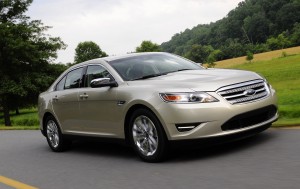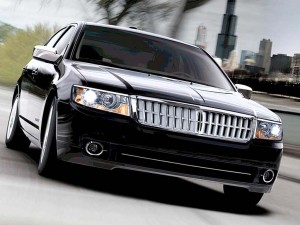
A new federal lawsuit claims scores of Ford products, like the Taurus, suffer from a "defect' that makes the vehicle suddenly accelerate.
A new lawsuit claims that nearly a decade’s worth of vehicles produced by the Ford Motor Co. suffer from a “design defect” that can make them susceptible to suddenly and unexpectedly begin racing out of control.
The lawsuit, filed in West Virginia federal court on behalf of 20 different owners in 14 states, is seeking class-action status that could, if approved, come to involve the owners of millions of Ford vehicles produced between 2002 and 2010.
“For too long, Ford has put its own financial interests ahead of its consumers’ safety,” said lead attorney Adam Levitt. “We hope this lawsuit sheds light on this important situation and requires Ford to correct its ways, compensate its customers and put them first.”
Ford is the latest in a string of manufacturers whose vehicles have been accused of experiencing so-called “unintended acceleration,” dating back to the late 1980s when Audi’s U.S. subsidiary became embroiled in a case involving its old Audi 5000 model. In 2009 and 2010, Toyota recalled nearly 8 million vehicles due to a variety of problems including sticky accelerators and loose floor mats that could jam gas pedals wide open.
Audi ultimately was vindicated by federal regulators who largely put the blame on driver error, something also cited in several investigations involving Toyota, the Japanese maker was also cleared of additional allegations that its vehicles were subject to unknown gremlins involving the electronic engine control systems used in its vehicles.
Nonetheless, Audi eventually redesigned the layout of its pedals to make it more difficult for consumers to inadvertently hit the gas instead of the brake. And Toyota is turning to so-called brake interlock systems that automatically throttle back if a motorist hits both pedals simultaneously.
In the lawsuit, attorneys insist Ford should have used a similar override as a “failsafe.”
According to the lawsuit, a 2011 report by the U.S. Department of Transportation found that Ford products racked up 22% of the complaints involving unintended acceleration between 2003 and 2009, and suffered the same number of deaths and injuries during that period as Toyota.
Ford not only “concealed” the defects cited in the lawsuit, but also “could have and should have” used a brake override system, the lawsuit alleges.
Among the many models targeted in the lawsuit are the 2008-2010 Taurus sedan, 2007-2010 Edge Crossover and 2004 to 2010 Explorer, as well as the 2006-2010 Lincoln MKZ luxury sedan. A number of models produced by the now-abandoned Mercury division, such as the 2005 to 2009 Grand Marquis, also are cited.
For its part, the automaker issued a statement asserting that the National Highway Traffic Safety Administration “has investigated alleged unintended accelerations many times over many years and has concluded that driver error is the predominant cause of these events. NHTSA’s work is far more scientific and trustworthy than work done by personal injury lawyers and their paid experts. In rare situations, vehicle factors, such as floor mats or broken mechanical components, can interfere with proper throttle operation, and manufacturers have addressed these rare events in field service actions.”
Virtually every automaker has, at one point or another, fielded complaints related to unintended acceleration. While a few, notably including Toyota, have been forced to take actions to deal with defects that could cause cars to race out of control, NHTSA has largely echoed Ford’s contentions.
The federal agency authorized two separate studies, one by the National Academy of Sciences, the other by NASA, that essentially cleared Toyota of electronic problems – though NASA researchers did note that it can be next to impossible to track some digital issues that may not be repeatable.
Nonetheless, Toyota recently reached a $1.1 billion settlement involving owners who claimed the unintended acceleration scandal resulted in lower trade-in values for their vehicles. And it has negotiated settlements involving some claims of wrongful death and injury.
The Ford lawsuit, meanwhile, comes in the wake of separate legal action against the maker claiming it intentionally misled consumers regarding the fuel economy of some of its vehicles.
(Ford official wants EPA to come up with more accurate mileage numbers. Click Here for that report.)


This is just siren chasers looking for jackpot justice to line their pockets with gold. It’s the “American way” to punish car makers for states issuing driver’s licenses to people who lack the ability to properly and safely operate a motorized vehicle of any kind. You can only do so much to compensate for driver stupidity and car makers do an excellent job of this. No one has EVER established that “unintended acceleration” exists.
The responsibility of driving properly and safely is that of the driver. The responsibility of issuing licenses only to qualified drivers is the sate. BOTH of these entities are guilty of neglegent, not the car companies.
You don’t see these bogus class action lawsuits in other countries because their judicial system is not as corrupt as the U.S. where the lawyers take care of their own an not only allow but legally support frivolous lawsuits for financial gain. The U.S. judicial system is as corrupt as any third world country IMO. Jackpot justice to compensating neglegent plantiffs and paid liars is unconscionable.